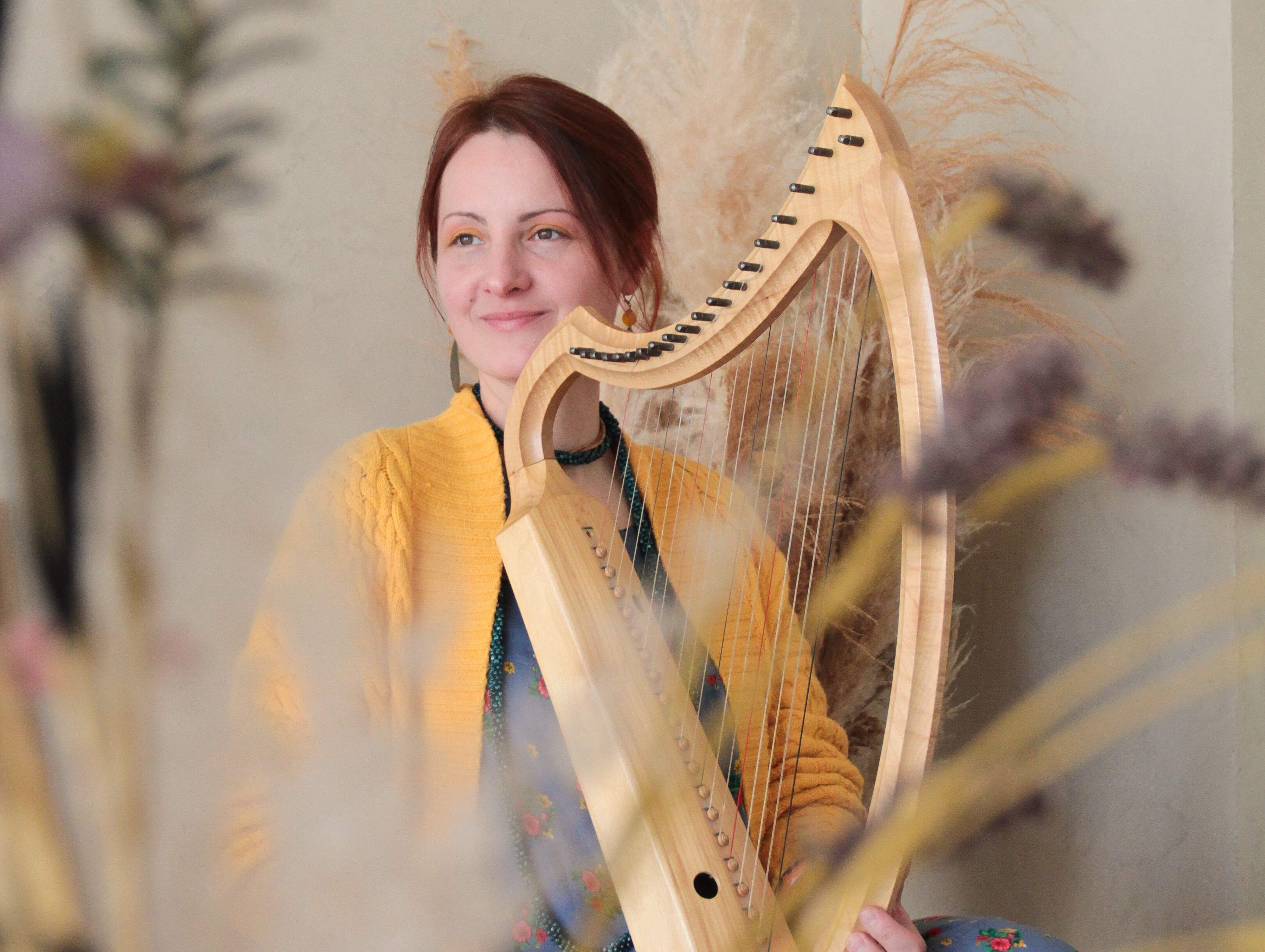
How it all began...
It all started before I arrived, when my mother joined the university ensemble. The conductor was a thin, tall and long-haired conservatory student - my father. So no wonder my childhood was full of music events and experiments.
First independent steps
17 years old was probably the age when I started my own musical journey. Of all genres in my background palette I was mostly fascinated by medieval fairyland. Like many other young people of that time I existed in a world of Irish whistles and dances, elves and dragons, bagpipes and drums, swords and horses, bicolor and linen dresses, Celtic runes and Romanesque patterns.
The first “ship” to welcome me "on board" as a singer, flutist and organist was the “Consort” ensemble in Nizhny Novgorod. And "Pfeyffer" after I moved to Moscow and started playing the celtic harp. About 10 years later - after graduating from the Academy of Music by Gnessins as a musicologist and changing my rather heavy harp to a light medieval one - I began performing medieval and renaissance repertoire with "Universalia in Re", "Labyrinthus" and "Alta Capella", celtic tunes with "Telenn Gwad", Early Orthodox chants with “Uzorika".
Listen to some music on Youtube
"Retour à Paris"
In 2016-2017, I was lucky to spend a year at the University of Paris IV Sorbonne practicing medieval music performance. Later back home I recorded a studio album. Gradually, this “student” work grew into an experiment - the result was something rather postmodern with a bit of kitsch and humour (hopefully my Russian and European colleagues will forgive me for kokoshnik on the cover).
The album was completed in the beginning of 2022. The subsequent tragic period made the release of the "Retour à Paris" postponed until better times. Some elements like text and design remain unfinished. The album seems to continue transforming and acquiring new meanings.
Learn more about the album on YouTube
Early Music in Russia
“Never before has the musical art of the distant past been so much in the spotlight of composers, performers and the public as it is today.” - declare the opening lines to the “Early Music” dictionary published in 1974 in the USSR.
Two years after the emigration of Andrei Volkonsky and two years before Alexey Lyubimov first heard the “St. Matthew Passion” conducted by Nikolaus Harnoncourt. About a decade of "Madrigal" success in Moscow. And “Musici segreti” underground in Leningrad.
Looking back at these 50 years - what has changed? How did the history of performing Early Music develop in this part of the world? Is it possible to talk about schools and continuity?...
See the project's page (in Russian)
It all started before I arrived, when my mother joined the university ensemble. The conductor was a thin, tall and long-haired conservatory student - my father. So no wonder my childhood was full of music events and experiments.
First independent steps
17 years old was probably the age when I started my own musical journey. Of all genres in my background palette I was mostly fascinated by medieval fairyland. Like many other young people of that time I existed in a world of Irish whistles and dances, elves and dragons, bagpipes and drums, swords and horses, bicolor and linen dresses, Celtic runes and Romanesque patterns.
The first “ship” to welcome me "on board" as a singer, flutist and organist was the “Consort” ensemble in Nizhny Novgorod. And "Pfeyffer" after I moved to Moscow and started playing the celtic harp. About 10 years later - after graduating from the Academy of Music by Gnessins as a musicologist and changing my rather heavy harp to a light medieval one - I began performing medieval and renaissance repertoire with "Universalia in Re", "Labyrinthus" and "Alta Capella", celtic tunes with "Telenn Gwad", Early Orthodox chants with “Uzorika".
Listen to some music on Youtube
"Retour à Paris"
In 2016-2017, I was lucky to spend a year at the University of Paris IV Sorbonne practicing medieval music performance. Later back home I recorded a studio album. Gradually, this “student” work grew into an experiment - the result was something rather postmodern with a bit of kitsch and humour (hopefully my Russian and European colleagues will forgive me for kokoshnik on the cover).
The album was completed in the beginning of 2022. The subsequent tragic period made the release of the "Retour à Paris" postponed until better times. Some elements like text and design remain unfinished. The album seems to continue transforming and acquiring new meanings.
Learn more about the album on YouTube
Early Music in Russia
“Never before has the musical art of the distant past been so much in the spotlight of composers, performers and the public as it is today.” - declare the opening lines to the “Early Music” dictionary published in 1974 in the USSR.
Two years after the emigration of Andrei Volkonsky and two years before Alexey Lyubimov first heard the “St. Matthew Passion” conducted by Nikolaus Harnoncourt. About a decade of "Madrigal" success in Moscow. And “Musici segreti” underground in Leningrad.
Looking back at these 50 years - what has changed? How did the history of performing Early Music develop in this part of the world? Is it possible to talk about schools and continuity?...
See the project's page (in Russian)
Ваш заказ
 POWER Full 14POWER Full 141000₽
POWER Full 14POWER Full 141000₽ POWER Full 14POWER Full 142000₽
POWER Full 14POWER Full 142000₽
3000₽
Оставляя заявку, вы соглашаетесь на обработку персональных данных и с условиями бронирования счёта
Craftum
Сайт создан на Craftum